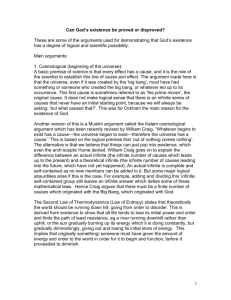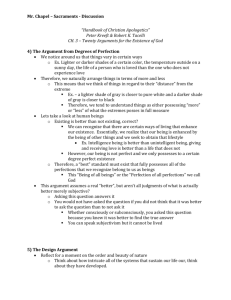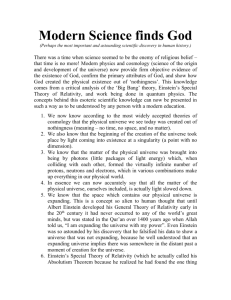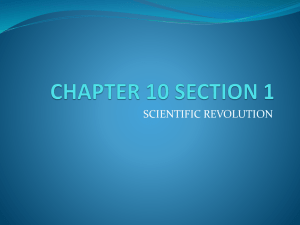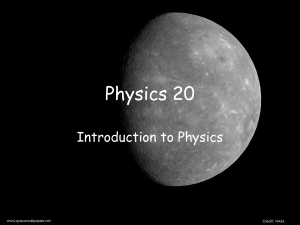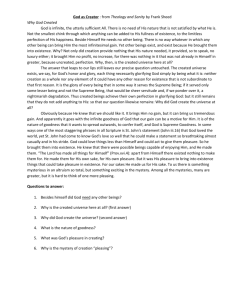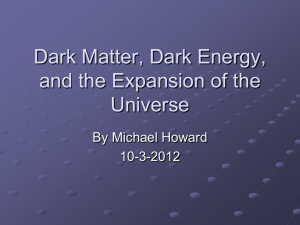GOD - Spiritist Federation of Florida
advertisement
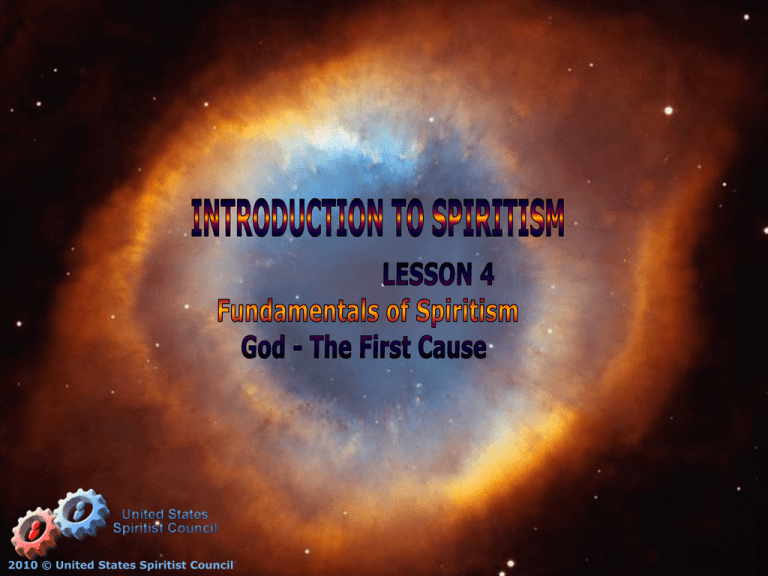
2010 © United States Spiritist Council Existence of God Existence of Spirits and their survival after death Reincarnation Multitude of inhabited worlds Communicability of the Spirits United States Declaration of Independence Throughout humankind era we see people encountering, accepting or renouncing the conception of God. • We hold these truths to be self-evident, that all men are created equal, that they are endowed by their Creator with certain unalienable Rights, that among these are Life, Liberty and the pursuit of Happiness. Declaration of the Rights of Man - 1789 Approved by the National Assembly of France, August 26, 1789 • In this document basic human rights were stated as coming from the state government rather than coming from God as traditional Catholic France has always believed. “France should renounce God.” Pierre Gaspar Schoumetre in 1793, at the Notre Dame Cathedral, in Paris In 1802, Napoleon Bonaparte restored the idea of God in France. Manifesto of the Communist Party 1848 It outlines the theory of the class struggle, and of the revolutionary role of the proletariat. Stating the historical materialism, they definitely renounced God, once again in humankind history. Karl Marx and Frederick Engels Spiritism - The Spirits’ Book In 1857, Prof. Rivail, in France, the great pedagogue, disciple of Johann Pestalozzi, published a book that would definitely place God as the basis of everything. 1. What is God? • Here are some questions and answers reproduced from the Spirit’s Book: – What is God? • God is the Supreme Intelligence, the First Cause of all things. – How should we define Infinity? • As that which has no beginning and no end. – Can we say that God is infinite? • In this case, your definition is incomplete. Unfortunately, human language is incapable of expressing ideas that transcend human intelligence. – In perfections God is certainly infinite. But God is also more than infinity, and we make an error in logic when we equate the two. A quality possessed by a being cannot, after all, be considered identical to the being itself. Furthermore, “Infinity” is an abstraction. To define something unknown, like God, by reference to something equally unknown, is, once again, to make an error in logic. “The Good” (Germanic Source) GOD Who or what is God? – “If I could say who or what God is, I would be God or God would not be God.” Epictetus (55-135), the great Stoic philosopher Proof’s of God’s Existence: “An axiom in science states. There is no effect without a cause. Look for the cause of whatever is not the work of human beings then reasoning itself will answer your question.” The Spirit’s Book, q. 4 Proof’s of God’s Existence: Bodies - the exhibition Blood Vessels, Heart Proof’s of God’s Existence: •Proverb: “The workman is known by his work” •The harmony that regulates the workings of the universe is only consistent with the existence of an Intelligent cause. Someone asked a poor and ignorant Bedouin, who prayed incessantly to God, how could he believe in Him. “By His works”, he said. And he explained: “Don't you recognize the origin of a jewel by the jeweler's trade mark? Don't you recognize the writer of a letter, from the handwriting on the envelope? Can’t you affirm that a camel and not a dog passed by the highway, simply by looking at the trace left behind by the animal? Thus, also, I know that God exists by His works.” “How? Explain it better.” It is very easy. The stars, in the sky, are not the work of human beings. Human beings could not have placed them there. Therefore, they can only be the work of God and therefore, God exists.” Using Science to prove God’s existence? The way Kardec approached his studies showed a constant parallelism between Spiritism and Science, in the domain of Astrophysics and Cosmology. They are unique sciences, where there can only be observations and no experiments. It is not necessary to observe black holes, stars in the confines of the dark universe or dark matter to know that they exist. In a similar way, it is not necessary to visualize Spirits and sense their influence to know that they exist. It is not possible to obtain a sample of the fabric of the universe, or to pull off a piece from the Sun, to place it on a slide and to put it under a microscope - The same way that Professor Allan Kardec created a method for a better understanding of the spiritual reality that involves us all. “The impossibility as far as I myself can see to disprove the existence of God, proves to me that God does exist.” Jean de La Bruyere 1645 -1696), was a French essayist and moralist. “God had to exist, otherwise, how could we exist?” “God manifests himself to us in the first degree through the life of the universe, and in the second degree through the thought of man.” Victor Hugo 1802-1885 Where to find God? NATURE CONSCIENCE Conscience is God present in man. Victor Hugo ‘Here and Hereafter’ by Leon Denis Attributes of God In order to sense God better, we give God certain attributes. • • • • • • God is infinite and eternal God is unchangeable God is immaterial God is unique (no other gods) God is all-powerful God is just and good EINSTEIN AND GOD “(…) Every one who is seriously involved in the pursuit of science becomes convinced that a spirit is manifested in the laws of the Universe -- a spirit vastly superior to that of man, and one in the face of which we with our modest powers must feel humble.” Albert Einstein - The Human Side, Selected and Edited by Helen Dukas and Banesh Hoffman, Princeton University Press, 1979. EINSTEIN AND GOD I believe in Spinoza's God who reveals himself in the orderly harmony of what exists, not in a God who concerns himself with the fates and actions of human beings. (Albert Einstein) (Albert Einstein, responding to Rabbi Herbert Goldstein who had sent Einstein a cablegram bluntly demanding "Do you believe in God?" Quoted from Victor J. Stenger, Has Science Found God? 2001, chapter 3.) God doesn’t smite or spare you from being smitten Oops No Pantheism • God is not the result of all forces and intelligences of the universe! Question 15 • "The odds against a universe like ours emerging out of something like the Big Bang are enormous .... I think clearly there are religious implications whenever you start to discuss the origins of the universe." Stephen W. Hawking Science finds God Charles Townes (Nobel Prize in Physics, 1964): “....somehow intelligence must have been involved in the laws of the universe.” John Polkinghorne (physicist): “When you realize that the laws of nature must be finely tuned to produce the universe we see, we have to admit the idea that the universe did not just happen, but that there must be a purpose behind it” QUIZ 1. What is God? a. The result of all forces and intelligences of the universe. b. The Supreme Intelligence of the Universe; the first cause of all things. 2. What is the origin of the word God? a. The “good”, from a Germanic source. b. “Wisdom”, from Latin. 3. Which proverb corroborates on God’s existence? a. "God is a busy worker but loves to be helped." b. “The workman is known by his work.” 4. What are some of God’s attributes? a. Unchangeable, Unique, Material and Eternal. b. Just, Infinite, All-Powerful and Eternal. 5. Where can we find God? a. In our conscience and in Nature. b. Only in religious places. Where is God • “Where is God?” a scientist asks. No one has even seen Him. “Who is He?” a materialist answers quickly. “God is an invention of faith!” • A thinker would say sensibly: “I cannot see God, but I feel that He exists. Nature shows clearly that the power of a Creator exists.” • But a poet would say with the conviction of a person who affirms because of he or she knows.” I see God in a child’s smile, in the sky, ocean, and the light in Nature...” • “I see God shining with the stars, in the eyes of a mother looking at her child, in beautiful nights by the moonlight. God’s heart beats in everything!” • “I see God in flowers and fields, in stars rolling around the Infinite. I hear God in the voice of sweethearts and feel God in the tears of the afflicted.” • “I perceive God in the word that forgives, I see God in the hand that caresses. I hear God in creatures in flight I feel God in peace and joy!” • “I see God in a doctor who saves, I foresee God in the pain that unites us. I discover God in the wise man that tries to understand human nature!” • “I see God in a kind gesture, I hear God in the hymns believers sing. I perceive God in the sun, in freedom And I see God in the plants and the seed!” • “Finally, I see God everywhere. That everything speaks of His powers, I discover God when art is expressed, In people’s love, I also feel God!” • “But the most beautiful place I feel God, In His most sublime vibration, Is not in the heart of Nature, It’s inside my own heart.”

